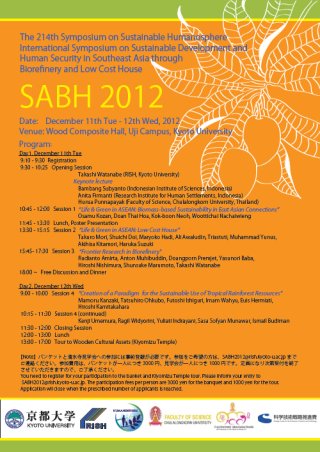主催者:
- 京都大学生存圏研究所 (議長 渡辺隆司)
- Chulalongkorn大学理学部 (共催)
- 文部科学省特別経費プロジェクト “ライフとグリーンを基軸とする持続型社会発展研究のアジア展開 —東アジア共同体構想を支える理念と人的ネットワークの強化—” (共催)
- 科学技術戦略推進費事業 “熱帯多雨林における集約的森林管理と森林資源の高度利用による持続的利用パラダイムの創出” (共催)
https://www.rish.kyoto-u.ac.jp/W/SABH2012/
目的と具体的な内容
化石資源の枯渇と温室効果ガスの排出による地球温暖化問題が深刻化するにつれ、化石資源の大量消費に依拠した 20 世紀型産業から脱却し、バイオマスを高度に変換してエネルギー、燃料、化学資源として利用する新しい産業体系、バイオリファイナリーの構築が求められている。東南アジア地域は、熱帯雨林に代表される豊かな生物資源を有しており、バイオリファイナリーを核に地域社会を復興することが強く期待される。これを実現するためには、東南アジア地域の未利用バイオマスの特性や資源量、地域社会が求めるバイオマス利用のあり方を理解するとともに、地域の未利用バイオマスの特性にあったバイオマス変換法の開発、社会へ還元するためのシステム構築が必要である。本シンポジウムでは、インドネシアカリマンタン島、タイ中央部、タイ北部、ベトナム北部などの有望な未利用バイオマスの情報を共有するとともに、地域復興を目指したバイオマス利用のあり方を議論する。同時に、バイオマスのバイオ燃料化技術や、バイオマスの構造分析法、インドネシアなど東南アジアの国々で重要となっている低コストの木造建築への移行などについての研究を紹介し、さらには現地および日本の地域研究者と得られた研究成果や情報を基に意見交換をし、バイオマス利活用を核としたアジア広域連携について議論した。本事業は、生存圏研究所と MOU を締結している Chulalongkorn 大学理学部、東南アジア研究所他と実施している特別経費プロジェクト「ライフとグリーン」のバイオマス社会研究、科学技術戦略推進費事業 “熱帯多雨林における集約的森林管理と森林資源の高度利用による持続的利用パラダイムの創出” と共催して実施した。
生存圏科学の発展や関連コミュニティの形成への貢献
本シンポジウムには、バイオマス変換、バイオマス利用技術、木造建築研究者の他、バイオマス社会研究の研究者が国内外から参加した。このため、バイオリファイナリーに立脚した熱帯地域社会のリノベーションのための分野横断型国際ネットワークの強化が図れた。これにより、国内外の研究機関との連携強化、生存圏研究所の活動内容の国内外への発信となった。タイのチュラロンコン大学理学部やインドネシアの RIHS、LIPI とは MOU を締結しており、MOU に基づく学術交流が進展する。また、先進素材開発解析システム(ADAM)共同利用やマイクロ波利用の生存圏フラッグシップ共同研究の発展に寄与する。また、太陽エネルギーの利用技術、熱変換プロセス高効率化、バイオマス変換技術の開発のみでなく、バイオマス利用の恩恵を地域に還元して社会発展を促進するシステムが必要不可欠である。本シンポジウムは、新材料創生研究、バイオエタノール、バイオケミカルス生産研究、低コスト木造建築と関連する木質材料の開発、森林再生からバイオマス社会の創成まで議論し、生存圏科学の発展や関連コミュニティの形成に貢献した。
プログラム
Day 1 Tuesday, December 11
| 09:10–09:30 | Registration Opening session Chair: Takuro Mori |
| 09:30–09:40 | Takashi Watanabe (RISH, Kyoto University, Japan) Opening address toward biomass–based sustainable society in Asia |
| 09:40–09:55 | Bambang Subyanto (LIPI, Indonesia) Current condition and future utilization of biomass in Indonesia |
| 09:55–10:10 | Anita Firmanti (Danny Cahyadi) (RIHS, Indonesia) Effort on generating green life in urban area |
| 10:10–10:25 | Hunsa Punnapayak (Faculty of Science, Chulalongkorn University, Thailand) Enhanced schemes for the prospecting of biomass-based biorefinery among Asian countries |
| 10:25–10:45 | Coffee break |
| Session 1 Life & Green in ASEAN: Biomass-based Sustainability in East Asian Connections Chair: Osamu Kozan |
|
| 10:45–11:00 | Osamu Kozan (CSEAS, Kyoto University, Japan) Reconstruction of biomass society by conservation and rehabilitation of peat land in Riau, Indonesia |
| 11:00–11:15 | Doan Thai Hoa (Hanoi University of Science and Technology, Vietnam) Delignification of rice straw by acetic acid for enzymatic saccharification |
| 11:15–11:30 | Kok–boon Neoh (CSEAS, Kyoto University, Japan) Effects of farming system and pesticide input on termite assemblage in Vietnamese coffee plantation |
| 11:30–11:45 | Woottichai Nachaiwieng (Faculty of Agro–industry, Chiang Mai University, Thailand) Rice husk as a potential ethanol production feedstock in Thailand |
| 11:45–13:30 | Lunch & Poster Session |
| Session 2 Life & Green in ASEAN: Low Cost House Chair: Takuro Mori & Ali Awaludin |
|
| 13:30–13:40 | Takuro Mori (RISH, Kyoto University, Japan) Setting up of cultivation network for low-cost house construction —In case of Indonesia |
| 13:40–13:55 | Shuichi Doi (Former Professor, University of Tsukuba, Japan) cancel Investigation of fungal community over houses |
| 13:55–14:10 | Ali Awaludin (Faculty of Engineering, Gadjah Mada University, Indonesia) Deterioration of dowel bearing properties of timber due to fungal attacks |
| 14:10–14:25 | Triastuti (LIPI, Indonesia) Wall building materials for low–cost housing in Indonesia |
| 14:25–14:40 | Maryoko Hadi (RIHS, Indonesia) Pre–fabricated wooden house composed of engineered timber for low income people in Indonesia |
| 14:40–14:50 | Akihisa Kitamori (RISH, Kyoto University, Japan) Wisdom on traditional buildings toward low–cost house |
| 14:50–15:05 | Muhammad Yunus (RIHS, Indonesia) Development of Bajo house technology base on local wisdom and local material |
| 15:05–15:15 | Haruka Suzuki (RISH, Kyoto University, Japan) Corporate strategy of local timber stores and sawmills in Pekanbaru, Riau, Indonesia |
| 15:15–15:45 | Coffee break |
| Session 3 Frontier Research in Bioerfinery Chair: Rudianto Amirta & Hiroshi Nishimura |
|
| 15:45–16:00 | Rudianto Amirta (Faculty of Forestry, Mulawarman University, Indonesia) Alkali pretreatment and enzymatic saccharification of plantation forest plant species growth in East Kalimantan |
| 16:00–16:15 | Anton Muhibuddin (Faculty of Agriculture, University of Brawijaya, Indonesia) Fungi diversity of plants cell and It’s potential for biological control |
| 16:15–16:30 | Doangporn Premjet (Center for Agricultural Biotechnology, Faculty of Agriculture, Naresuan University, Thailand) Effect of ploidy on fatty acids of Jatropha curcas L. |
| 16:30–16:45 | Yasunori Baba (Graduate School of Agricultural Science, Tohoku University, Japan) Biological pretreatment of cellulosic biomass with waste cattle rumen fluid for methane production |
| 16:45–17:00 | Hiroshi Nishimura (RISH, Kyoto University, Japan) High resolution and quantitative NMR Analysis of whole milled wood and biodegraded wood |
| 17:00–17:15 | Shinsuke Marumoto (RISH, Kyoto University, Japan) Identification of germicidial compound against picornavirus in bamboo pyroligneous acid |
| 17:15–17:30 | Takashi Watanabe (RISH, Kyoto University, Japan) Biorefinery study to utilize whole cell wall components for 2nd generation biofuels, chemicals and functional materials |
| 18:00 | Dinnar & Poster Session
|
Day 2 Wedensday, December 12
| Session 4 Creation of a Paradigm for the Sustainable Use of Tropical Rainforest Resourcess Chair: Mamoru Kanzaki |
|
| 09:00–09:15 | Mamoru Kanzaki (Faculty of Agriculture, Kyoto University, Japan) Utilize the biodiversity of Tropical Rainforest |
| 09:15–09:30 | Tatsuhiro Ohkubo, Futoshi Ishiguri,Imam Wahyudi (Department of Forest Science, Utsunomiya University, Japan) Searching unutilized fast growing native species and the wood properties in secondary forests after shifting cultivation and selection cutting area in Central Kalimantan, Indonesia |
| 09:30–09:45 | Euis Hermiati (LIPI, Indonesia) Screening of tropical fast growing wood species for bioethanol production |
| 09:45–10:00 | Hiroshi Kamitakahara (Faculty of Forestry, Kyoto University, Japan) Diversity of sustainable biomaterials in Central Kalimantan |
| 10:00–10:15 | Coffee break |
| Session 4 (continued) Chair: Kenji Umemura (RISH, Kyoto University, Japan) |
|
| 10:15–10:30 | Kenji Umemura Comparison of mechanical properties of plywoods manufactured from plantation and natural woods |
| 10:30–10:45 | Ragil Widyorini (Faculty of Forestry, Gadjah Mada University, Indonesia) Wood properties of fast growing Meranti |
| 10:45–11:00 | Yuliati Indrayani (Faculty of Forestry, Tanjungpura University, Indonesia) Physical and mechanical properties of Red Meranti (Shorea leprosula Miq) particleboard from natural and plantation forest |
| 11:00–11:15 | Sasa Sofyan Munawar (LIPI, Indonesia) Development of gypsum board made from Red Meranti (Shorea leprosula) |
| 11:15–11:30 | Ismail Budiman (LIPI, Indonesia) Cement bonded particleboard from natural and plantation Red Meranti (Shorea leprosula) |
| Closing session | |
| 11:30–12:00 | Takashi Watanabe, Takuro Mori, Bambang Subyanto, Mamoru Kanzaki, Osamu Kozan, Hunsa Punnapayak, Rudianto Amirta |
| 12:00–13:00 | Lunch |
| 13:00–17:00 | Tour to wooden cultural assets, Kiyomizudera temple |
 |
ポスター PDF ファイル (2 007 947 バイト) ポスター制作: 鈴木遥 (京都大学生存圏研究所) |


